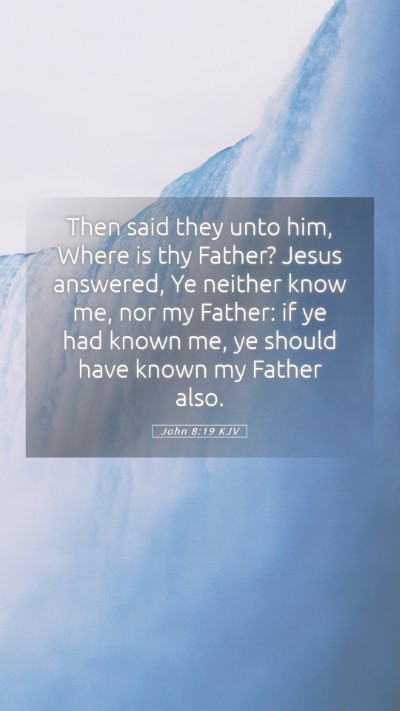Understanding John 8:19
John 8:19 states, "Then they said to Him, 'Where is Your Father?' Jesus answered, 'You know neither Me nor My Father. If you had known Me, you would have known My Father also.' This verse is rich in theological significance and highlights crucial aspects of the relationship between Jesus and His Father, as well as the spiritual blindness of the questioning audience.
Bible Verse Meanings and Interpretations
In order to grasp the full meaning of Bible verses, especially this one, it's vital to consider the context and the broader implications of Jesus' statement. The conversation occurs during a confrontation between Jesus and the religious leaders of the Jews. Their inquiry, 'Where is Your Father?', reflects their misunderstanding of Jesus' divine nature and His intimate relationship with God the Father.
Commentary Insights
-
Matthew Henry's Commentary:
Henry emphasizes the ignorance of the Jews, asserting that they did not recognize Jesus as the Son of God, nor did they understand His spiritual authority. He points out that if they truly knew Jesus, they would comprehend the nature of His divine parentage. This illustrates a deeper spiritual blindness and lack of faith among the people.
-
Albert Barnes' Commentary:
Barnes elaborates on the inquiry regarding the Father, indicating that the Jews were likely seeking a literal father figure rather than understanding God’s nature. Barnes notes that Jesus’ response indicates that to know Him is to know the Father, thus asserting the unity of their essence and mission.
-
Adam Clarke's Commentary:
Clarke reflects on the implications of the dualism presented in the question and Jesus' firm assertion. He posits that Jesus' declaration serves as a profound truth for believers: to recognize Jesus is to recognize God. Clarke stresses the importance of this relationship for understanding the Christian faith and for identifying the path to salvation.
Theological Significance
This verse encapsulates essential doctrines of Christian faith, particularly Christology and the Trinity. Understanding Scripture in this way allows for a profound meditation on the nature of God, the identity of Jesus, and His mission on Earth.
Scripture Analysis
From a Bible study perspective, John's Gospel is unique in presenting a direct discourse on the identity of Jesus and His revelations. The self-revelatory statements of Jesus in this passage invite us to further explore how scripture analysis unlocks the richness of biblical texts.
Cross References
- John 14:7 - "If you had known Me, you would have known My Father also."
- John 1:18 - "No one has seen God at any time. The only begotten Son, who is in the bosom of the Father, He has declared Him."
- John 10:30 - "I and my Father are one."
- Matthew 11:27 - "All things have been delivered to Me by My Father, and no one knows the Son except the Father."
- Hebrews 1:3 - "Who being the brightness of His glory and the express image of His person, and upholding all things by the word of His power."
Application in Daily Life
Learning how to apply Bible verses to daily life is crucial for spiritual growth. Recognizing the connection between Jesus and the Father invites individuals to deepen their relationship with both. This understanding can inspire one to seek a more profound faith and to trust in the revelations provided through Scripture.
Conclusion
In summary, John 8:19 is not merely a historical assertion but an invitation to all believers to comprehend the essence of faith in Jesus Christ and His representation of God the Father. The juxtaposition of human ignorance against divine revelation offers profound lessons in humility, faith, and pursuit of truth.
Further Study Resources
- Bible study guides focusing on the Gospel of John
- Online Bible study tools for deeper analysis of texts
- Bible study courses emphasizing New Testament teachings


